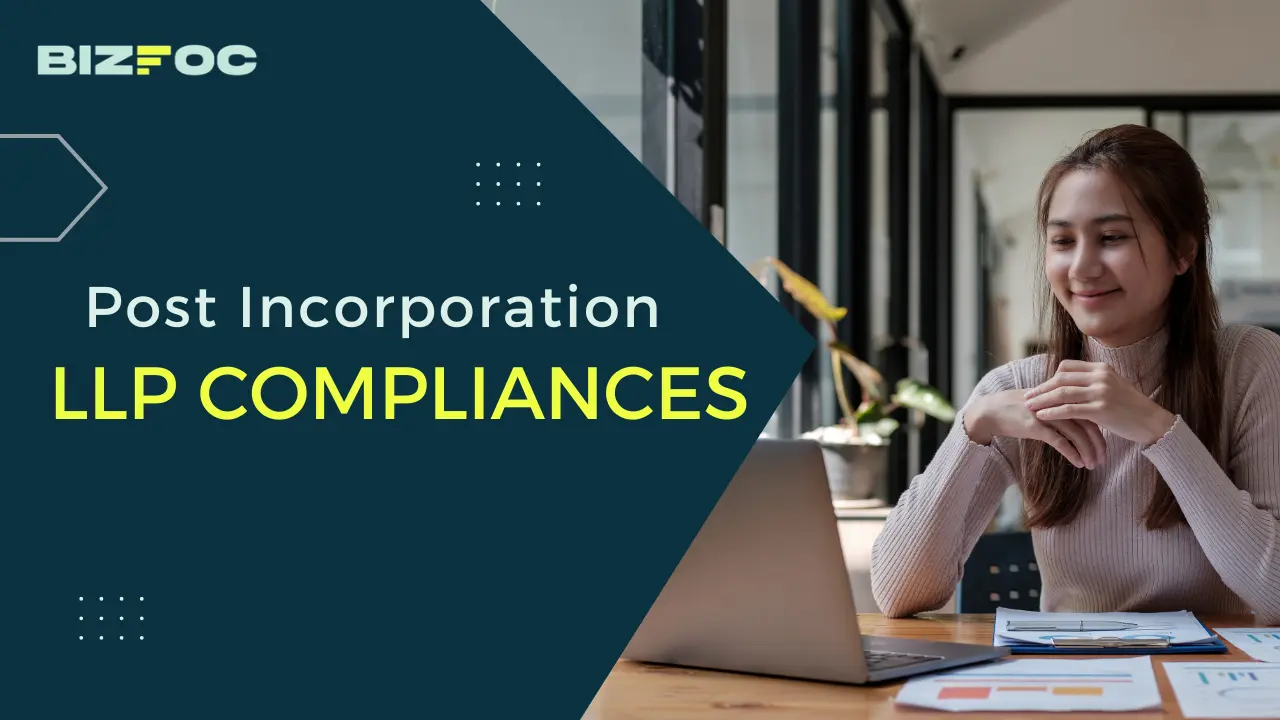Publishing Date: 09 Sep, 2024

Limited Liability Partnership or LLP after it gets incorporated includes several compliances and these are mandatory compliance as per law. Even if there is delay in starting business activity, these compliance must be completed to remain compliant as per the law. These compliances should be completed on time, otherwise you have to pay heavy penalties. LLP is an artificial person hence compliance must be done by partners of the LLP. These compliances completed just after the incorporation of LLP or within 30 days after its formation. However, there are also few annual compliances that need to be completed yearly. In this article we will discuss post incorporation compliances for LLP.
A limited Liability Partnership is separated from its members and they are liable only for the amount they invested. Limited Liability Company includes the benefits of both a company and a partnership. In a LLP Company, partners' personal assets are safe and secure. In case of any debt or liability of a company, they don’t need to pay from their personal assets as LLP is considered as a separate legal entity. The LLP used to take legal actions in its own name. They are able to enter into contracts and can hold property on their own. This structure helps in appealing to professionals like accountants, attorneys, and consultants as it permits flexibility in management without the formality needed in a corporation.
After an LLP is registered and CIN number is issued, it must complete certain compliances and procedural agreements within a few days of its incorporation. These compliances should be generally completed within 30 days, 60 days or on by a specific deadline, depending on the requirement. They include a LLP agreement filing (LLP-Form 3), opening a bank account in the LLP’s name etc. Additionally, LLPs should comply with certain annual filings like Form 11 (Annual Return) and Form 8 (Statement of Account & Solvency). Also, it is mandatory to maintain a proper book of account. If their turnover exceeds ₹40 lakhs or contribution exceeds ₹25 lakhs, they must conduct audits and file annual income tax return. Compliance also extends to updating the ROC about alteration such as partner addition or removal, registered office changes, and amendments to the LLP Agreement. Timely and accurate completion of post registration requirements ensures that the LLP stays in good legal standing and avoids penalties or legal issues
Following are the compliances needed to be done within a specific due date. These compliance are important from a legal viewpoint. Also you need to bear heavy penalties if the compliances are not accurate. Separate PAN and TAN applications are not required now. PAN and TAN letter comes along with incorporation of LLP on registered company email.
|
Particulars |
Due Date |
|
LLP Agreement filing or Form 3 |
Within 30 Days |
|
LLP Seal and Partner seal |
Within 30 Days or before signing LLP agreement |
|
Letterhead or LLP Stationery |
Within 30 Days |
|
Bank Account Opening |
Within 30 Days |
|
Form 11 (LLP Annual Return) |
Within 60 Days from the end of Financial year i.e 30th May |
|
Form 8 (Statement of Account and Solvency) |
Within 30 days from the end of six months of financial year to which it relates i.e 30th September |
|
Filing of IncomeTax Return:
|
31st of July every year 30th of September every year |
|
Designated Partners KYC |
On or before 30th of September every year |
The compliances should be followed by the firm after incorporation. Remember the compliances that should be done within 30 days performed only for one time while the annual compliances need to be completed every year. The compliances for LLP within 30 days are as follow:
There are certain mandatory compliances for LLPs that need to be completed annually. These compliances include Form-11, form-8, ITR, designated partner KYC, etc.
Apart from the compliances with due dates, there are certain optional relevant responsibilities that beyond from due date. These tasks can be performed anytime by the incorporated company. These compliances should be done so that they can plan to improve their operational efficiency, legal protection and growth prospects.
These compliances listed several specific licenses, IPR registration, GST registration, and MSME registration It promotes transparency, credibility, and competition in the marketplace. However, it is an optional registration and not a lawful requirement.
In case if the company does not obtain a professional tax registration, it can lead as a violation of tax laws, which could affect its legal operation. Also it draws more attention from regulatory bodies.
There is a lot of compliance to be done after incorporation of LLP. It is crucial for smooth functioning of an LLP. One should maintain an accurate record and file these compliance on time. If the compliances are not filed on time, heavy penalties may be charged. By filing compliances on time, one can focus on the growth of the business. Proper and accurate compliances protect the LLP from legal obligation as well it increase credibility and stability in the business environment. The compliances should be completed within 30 days, 60 days and on specific dates depending on its type.
Yes, LLPs are required to file Form-11 with ROC after the incorporation.
If the turnover exceeds Rs. 40 lakh or its contribution exceeds Rs. 25 lakh, LLP is required to get its accounts audited.
Form-11 is an annual return for LLP that needs to be filled even if the business does not carry out any operations or business during the financial year.
LLPs with a turnover of exceeding INR 1 Cr. for business or INR 50 lakh for a profession are required to undergo a tax audit as per section 44AB of Income-tax Act.

Top 12 Best Future Business Ideas That Will Boom in 2050
21 Nov, 2024

Step-by-Step Process for GeM Registration on GeM Portal
21 Nov, 2024

Difference Between Partnership and OPC
21 Nov, 2024

How to apply for Patanjali Franchisee?
21 Nov, 2024

Top 10 Best Healthcare Business Ideas That You Can Start
21 Nov, 2024
Share article via:
